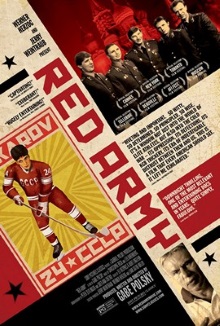
I got this pick from Marginal Revolution and subsequently saw it as a notable film in a couple of other places. Tyler Cowen rated it very highly but after starting to watch this, I realized that I should have taken into account that Cowen is probably more of a fan of sports than I am. Anyway this is a documentary about the intensive, possibly torturous, ice hockey program that the Soviet Union ran as part of its propaganda machine during the Cold War.
The story of the team that is the subject of this documentary really starts just after the Second World War with the innovative coach Anatoli Tarasov who was tasked with creating the program from scratch as ice hockey was an unknown sport in the Soviet Union. The focus however is on the era after Tarasov is pushed out of the team and is replaced by Viktor Tikhonov who the film claims was a KGB appointee. Colloquially known as the Red Army as the team is formally part of the military, they achieve massive success on the international arena. Though there are a number of different interviewees in this film, the primary interlocutor is Viacheslav Fetisov, the long-time captain of the team and one of the members of the five-man unit that utterly dominated the ice hockey scene while they were together.
If this were a film about ice hockey alone, it would still be a remarkable story given the dramatic ups and downs experienced by the members of the team, but the brilliance of director Gabe Polsky is in realizing that it’s never about sports alone. Red Army was made possible only because the Soviet leadership decided to make it a point of national pride and poured in massive resources to make it possible. As a branch of the army, they could pick the very best players onto the team and manage them to a standard of discipline that would have been impossible in the West. But as the film shows, in the end it is still the West who has the last laugh. While the US could never produce a team or even any players who could consistently beat the Red Army, the incredible wealth of the NHL teams was an irresistible allure. The more success and the more fame Red Army earned, the more their KGB handlers feared that they would defect to the West. Even the Soviet state itself seemed unable to resist, allowing players to leave in exchange for contracts that promised most of their salaries to the Soviet government, payable to the embassy.
Festisov’s personal story in all this makes for an equally riveting watch. As arguably the most valuable player in Red Army he was naturally much sought after by NHL teams. To keep him happy, Tikhonov promised to let him go but continually put his departure off by claiming that he was needed for key matches. Eventually Festisov quit in frustration and he went overnight from being a national hero to a pariah who is harassed by the security services, making Red Army a film that is also about Soviet repression. When he is eventually allowed to leave under Mikhail Gorbachev’s more open regime, it is like opening the floodgates to a whole slew of hockey players exiting the country.
Finally Red Army is also an intriguing take on how important it is to de-emphasize the individual in favor of the group when it comes to team sports. When NHL eventually picked up the Soviet stars, great things were expected of them and yet they all performed disappointingly. Part of this is surely because many of them were aging by the time they were allowed to leave but the film argues that this was mostly because the style of play in the US valorizes the individual instead of the team and the Soviet players just didn’t fit in among their new teammates. Later when the Detroit Red Wings managed to snag five star ex-Soviet players to form a new Red Army, they went to once again earn massive success in the 1990s, proving the value of teamwork.
As someone who doesn’t follow hockey, I confess that I can’t quite appreciate the brilliance of their plays or the beauty of their maneuvers. I also find it a bit odd that the film, following the opinions of the players who allowed themselves to be interviewed, sees Tikhonov as the villain of the piece especially as the man himself refused to cooperate with this documentary. While the players themselves seem to think they could have succeeded without him and that he certainly could never have succeeded without them, it seems to me Tikhonov’s amazing track record speaks for itself and Red Army could never have become what it was without him at the helm. Still you don’t have to be a fan of hockey to see what an incredible story this is and appreciate how the rise and fall of Red Army is a mirror to that of the Soviet Union itself.